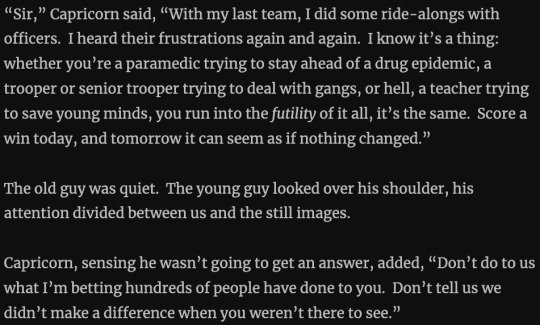#sorry for the daredevil tangent that comic's just kinda fun to poke at
Text

So there's a few ways we've seen the public hostility to capes be framed.
There's complaint 1, the general "all parahumans are more trouble than they're worth," which has been something that's at least been brewing since Worm (a lot of Cauldron and the PRT's activities being focused on tamping down on this perception). A fairly common trope in superhero media. You see it everything from the X-Men to the Civil War comic event. Hell, its popular enough that the last two comics I've read (Chainsaw Man and Clown Corps), which are pretty much as different as you can be while still being in the same vague genre and medium, both had "Villains try to get everyone to fear superpeople indiscrimantly" plots.
But then there's the more specific complaint 2: "cape heroes aren't justifying their presence because they directly cause violence without lowering the amount of crime and violence overall." Now, Capricorn is obviously framing it in these terms because he's trying to appeal to the police he's talking to; he knows that's a complaint made about cops and he wants to make them feel like they're on the same side fighting the same battles (and in turn kinda claiming that both capes and cops are "against" a public who criticizes them). But I'd also say that the text itself wants us to consider complaint 2. Worm basically endorses it; a lot of the book reinforces the claim that capes/cops are integral to how a system gives rise to villains/criminals and largely fails to deal with such problems in a useful manner.
The question is whether Ward is best interpreted as making the opposite claim, endorsing Tristan's argument against complaint 2. Its certainly sympathetic to the frustrations of the "don't tell us we didn't make a difference when you weren't there to see" crowd—it almost has to be, given our narrator. But whereas in some parts I read Ward as saying "yeah its frustrating, but they're right, you aren't making a real difference and are part of the problem" other times it does portray Breakthrough making real changes for the better that couldn't have been accomplished other ways by fighting ontologically evil enemies (see: Teacher).
Again, kinda hard to do a story from this POV and completely avoid that. Disco Elyisum probably does the best job of it and I've still seen people argue that it doesn't avoid it entirely (still unsure where I land on that). Zdarsky's Daredevil (man I need to catch up on that) tries to avoid it in a way that doesn't really cohere; largely because it tries to be anti-prison while still framing characters like Spider-Man as paragons. Though in that at least it kinda works with Matt Murdock's whole pattern of righteous violence followed by intense doubt and guilt followed by newly directed righteous violence. I guess I'll have to keep reading to see how things ultimately land.
#leo reads ward#ward 10.5#wardblr#parahumans#wildbow#sorry for the daredevil tangent that comic's just kinda fun to poke at#reminds me of ave wiseman's critique of how the two knives out movies show changing public attitudes towards the justice system#leo says
53 notes
·
View notes